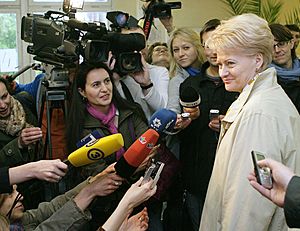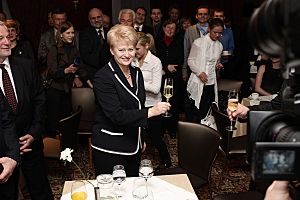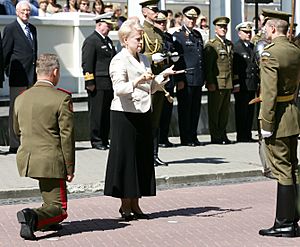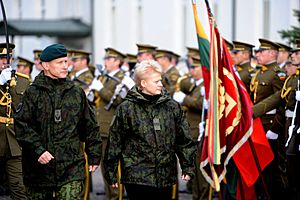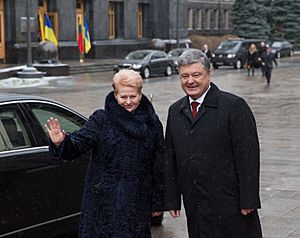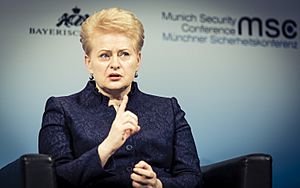Dalia Grybauskaitė facts for kids
Quick facts for kids
Dalia Grybauskaitė
|
|
|---|---|
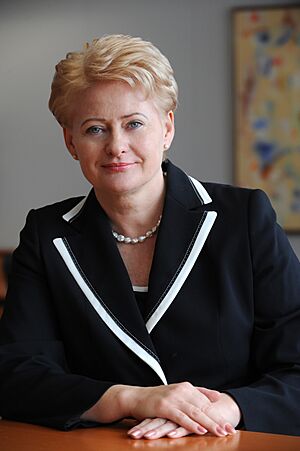
Official portrait, 2008
|
|
| 8th President of Lithuania | |
| In office 12 July 2009 – 12 July 2019 |
|
| Prime Minister | Andrius Kubilius Algirdas Butkevičius Saulius Skvernelis |
| Preceded by | Valdas Adamkus |
| Succeeded by | Gitanas Nausėda |
| European Commissioner for Financial Programming and the Budget | |
| In office 22 November 2004 – 1 July 2009 |
|
| President | José Manuel Barroso |
| Preceded by | Michaele Schreyer Markos Kyprianou (Budget) |
| Succeeded by | Algirdas Šemeta |
| European Commissioner for Education and Culture | |
| In office 1 May 2004 – 11 November 2004 Served with Viviane Reding |
|
| President | Romano Prodi |
| Preceded by | Viviane Reding |
| Succeeded by | Ján Figeľ (Education, Training, Culture and Multilingualism) |
| Minister of Finance | |
| In office 12 July 2001 – 1 May 2004 |
|
| Prime Minister | Algirdas Brazauskas |
| Preceded by | Jonas Lionginas |
| Succeeded by | Algirdas Butkevičius |
| Personal details | |
| Born | 1 March 1956 Vilnius, Lithuanian SSR, Soviet Union (now Lithuania) |
| Political party | Communist Party of the Soviet Union (1983–1989) Communist Party of Lithuania (1989–1990) Independent (1990–present) |
| Alma mater | Leningrad State University Georgetown University |
| Signature | |
Dalia Grybauskaitė (born 1 March 1956) is a Lithuanian politician. She served as the eighth president of Lithuania from 2009 to 2019. She was the first woman to hold this important position. In 2014, she also became the first Lithuanian President to be reelected for a second time. Before becoming president, Grybauskaitė was Lithuania's Minister of Finance. She also worked as a European Commissioner for the European Union. People sometimes call her the "Iron Lady" because she is strong and determined.
Contents
Dalia Grybauskaitė: Her Early Life and Education
Dalia Grybauskaitė was born on March 1, 1956, in Vilnius, Lithuania. Her family was working-class. Her mother, Vitalija Korsakaitė, was a saleswoman. Her father, Polikarpas Grybauskas, worked as an electrician and driver.
School Days and Sports
Dalia went to Salomėja Nėris High School. She said she wasn't the best student, usually getting fours out of five. Her favorite subjects were history, geography, and physics. When she was eleven, she started playing basketball and loved it.
University and Early Work
At nineteen, Dalia worked for a year at the Lithuanian National Philharmonic Society. Then, she went to Saint Petersburg State University in Russia to study political economy. While studying, she also worked in a local factory. In 1983, she graduated and returned to Vilnius. She worked at the Lithuanian Academy of Sciences. Later, she lectured on political economics and global finance at the Vilnius Communist Party High School.
Studying Abroad
In 1990, Lithuania became independent from the Soviet Union. Dalia continued her studies at Georgetown University in Washington D.C., USA. She joined a special program for senior executives.
Dalia Grybauskaitė's Career Before Presidency
After her studies, Dalia Grybauskaitė worked in various important roles.
Working for Lithuania's Government
From 1991 to 1993, she was the Director of the European Department at Lithuania's Ministry of International Economic Relations. She then worked at the Foreign Ministry. She helped Lithuania join European Union free trade agreements. She also helped coordinate aid from other countries. Soon after, she became a special representative for Lithuania at the European Union in Brussels.
Roles in Finance and Foreign Affairs
In 1996, Dalia became a minister at the Lithuanian embassy in the United States. She held this role until 1999. Then, she became the deputy Minister of Finance. In this job, she led Lithuania's talks with the World Bank and International Monetary Fund. In 2000, she became Vice Minister of Foreign Affairs. In 2001, she became the full Minister of Finance.
Becoming a European Commissioner
Lithuania joined the European Union on May 1, 2004. On the same day, Dalia Grybauskaitė was named a European Commissioner.
European Commission Work
Dalia Grybauskaitė first served as the European Commissioner for Education, Culture, Multilingualism and Youth. This role lasted until November 2004. Then, she became the European Commissioner for Financial Programming and the Budget. She worked in this role under President José Manuel Barroso.
"Commissioner of the Year" Award
In November 2005, Dalia was named "Commissioner of the Year" by a European newspaper. She received this award for trying to make the EU spend more money on things like research. She said it was an honor for all new EU countries. She also said it was a prize for being brave enough to speak the truth about Europe's budget.
Improving the EU Budget
As the Financial and Budget Commissioner, she openly criticized the EU budget. She said it was "not a budget for the 21st century." Most of the EU's money was spent on farming. Grybauskaitė changed this. In 2008, for the first time, more money was spent on growth and jobs than on agriculture. She also warned the Lithuanian government about the coming financial crisis.
2009 Presidential Election
On February 26, 2009, Dalia Grybauskaitė announced she would run for president. She said she wanted to return to Lithuania if people needed her. She promised truth, openness, and responsibility for the country. She wanted people to live without fear and have confidence in their future.
Campaign Focus
Polls showed Grybauskaitė was the clear favorite. She ran as an independent candidate. Her campaign focused on problems within Lithuania. The country was facing a deep economic downturn. The unemployment rate was high. Dalia promised to help people with low incomes. She also wanted to make the government simpler. She promised a more balanced approach to foreign policy.
A Historic Victory
The election was held on May 17, 2009. Grybauskaitė won by a large margin, getting 69.1% of the votes. This was the biggest win in a free election in Lithuania's history. She became the first female president of Lithuania. News outlets called her the "Lithuanian Iron Lady." This was because of her strong way of speaking and her black belt in karate. She speaks Lithuanian, English, Russian, French, and Polish. She has mentioned Margaret Thatcher and Mahatma Gandhi as her role models.
Presidency (2009–2019)
Dalia Grybauskaitė became president on July 12, 2009. She decided to accept only half of her presidential salary. Her first visits as president were to Sweden and Latvia. In 2011, she visited Norway. She supported the NATO-led military action in Libya.
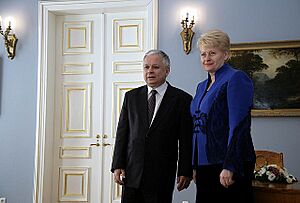
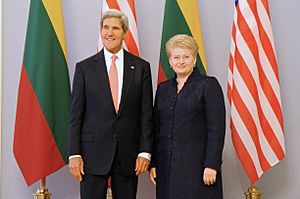
In 2014, Grybauskaitė was reelected as President. She won with 58% of the vote in the second round.
Domestic Policy
Leadership Style
Experts say that the President's office was very strong during Grybauskaitė's time. She used her powers effectively. She often met with prime ministers and ministers to share her views. During her reelection campaign, some accused her of being too controlling. However, she said she just wanted to use the existing presidential powers better. She was generally seen as a president who worked well with conservative voters.
Government Changes
When Grybauskaitė became president, she promised to fight corruption. She removed several government officials from their positions. For example, she fired a deputy director of the State Security Department. She also recalled a diplomat from the Lithuanian embassy in Georgia.
Working with Parliament
After the 2012 parliamentary election, Grybauskaitė said she would not accept a government that included the Labour Party. This party had many seats in parliament. She saw them as too close to Russia. However, a coalition government was formed with the Labour Party and Social Democrats. Grybauskaitė still had influence. She checked the minister candidates proposed by the Labour Party. She even tested their English skills.
Foreign Policy
Relations with Russia
At the start of her first term, Grybauskaitė tried to improve relations with Russia. In 2010, she met with Russian Prime Minister Vladimir Putin. She later said that during this meeting, she realized Russia wanted to control its neighbors. She felt they were trying to make Lithuania "kneel." After this meeting, relations between Lithuania and Russia became colder.
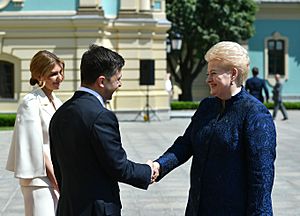
In 2013, Grybauskaitė decided to boycott the Sochi Winter Olympics in Russia. This was due to concerns about human rights. Relations with Russia worsened during her second term. She took a strong stance against Russian influence in Europe. In 2014, she called dependence on Russian gas an "existential threat" to Lithuania. She also compared Russia's actions to those of Stalin and Hitler. In November 2014, she called Russia a "terrorist state." In 2018, she warned that Lithuania should be ready for a Russian invasion. She also said Lithuania would increase military help to Ukraine.
Relations with the EU and United States
In 2014, Grybauskaitė said Lithuania would take responsibility for a secret CIA prison in Lithuania. In 2017, she criticized Poland's government for not supporting Donald Tusk for President of the European Council.
Brexit
In January 2019, Grybauskaitė said that a "no-deal Brexit" would be better than delaying Brexit. She believed the EU could make smaller agreements to help if there was no deal.
Post-Presidency (2019–Present)
After her presidency ended in 2019, Dalia Grybauskaitė continued to be active internationally.

In March 2020, she was appointed as a co-chair of a special panel. This panel works on international financial transparency. Following the 2022 Russian invasion of Ukraine, Grybauskaitė publicly supported strong action against Russia. She believed that diplomatic talks had failed. She said, "War can be only stopped by a war, which has already started."
In 2024, she received an award from Hillary Clinton. Clinton praised Grybauskaitė for her early warnings about Russia's actions. In November 2024, Grybauskaitė criticized the decision of the Lithuanian Social Democrats to form a government with a nationalist party. She called it a "Kremlin-scented coalition."
Personal Life
Besides her native Lithuanian, Dalia Grybauskaitė speaks English, Russian, and Polish fluently. She also speaks some French. She has a black belt in karate.
Awards
Dalia Grybauskaitė has received many national and international awards for her work:
| Year | Award | Issuer |
|---|---|---|
| 2003 | The Commander's Cross of the Order of the Lithuanian Grand Duke Gediminas | Lithuania |
| 2009 | The Order of Vytautas the Great with the Golden Chain | Lithuania |
| 2011 | Commander Grand Cross with Chain of the Order of the Three Stars | Latvia |
| 2011 | Knight Grand Cross of the Royal Norwegian Order of St. Olav | Norway |
| 2011 | Knight Grand Cross of the Order of the Falcon | Iceland |
| 2012 | Member of Xirka Ġieħ ir-Repubblika | Malta |
| 2012 | Grand Officer of the Order of Saint-Charles | Monaco |
| 2013 | Knight Grand Cross with Collar of the Order of the White Rose of Finland | Finland |
| 2013 | Knight Grand Cross with Collar of the Order of the Cross of Terra Mariana | Estonia |
| 2013 | Grand Cross Special Class of the Order of Merit of the Federal Republic of Germany | Germany |
| 2013 | Charlemagne Prize for 2013 | Aachen |
| 2015 | Order of the Republic | Moldova |
| 2015 | Collar of the Order pro merito Melitensi | SMOM |
| 2015 | Knight of the Order of the Seraphim | Sweden |
| 2016 | Order for Exceptional Merits | Slovenia |
| 2016 | Collar of the Order of the Star of Romania | Romania |
| 2018 | Knight Grand Cross of the Order of the Netherlands Lion | Netherlands |
| 2018 | Knight Grand Cross of the Order of Merit of the Italian Republic with Collar | Italy |
| 2018 | Member of the Order of Liberty | Ukraine |
| 2019 | Knight of the Order of the White Eagle | Poland |
See also
 In Spanish: Dalia Grybauskaitė para niños
In Spanish: Dalia Grybauskaitė para niños
 | Madam C. J. Walker |
 | Janet Emerson Bashen |
 | Annie Turnbo Malone |
 | Maggie L. Walker |


